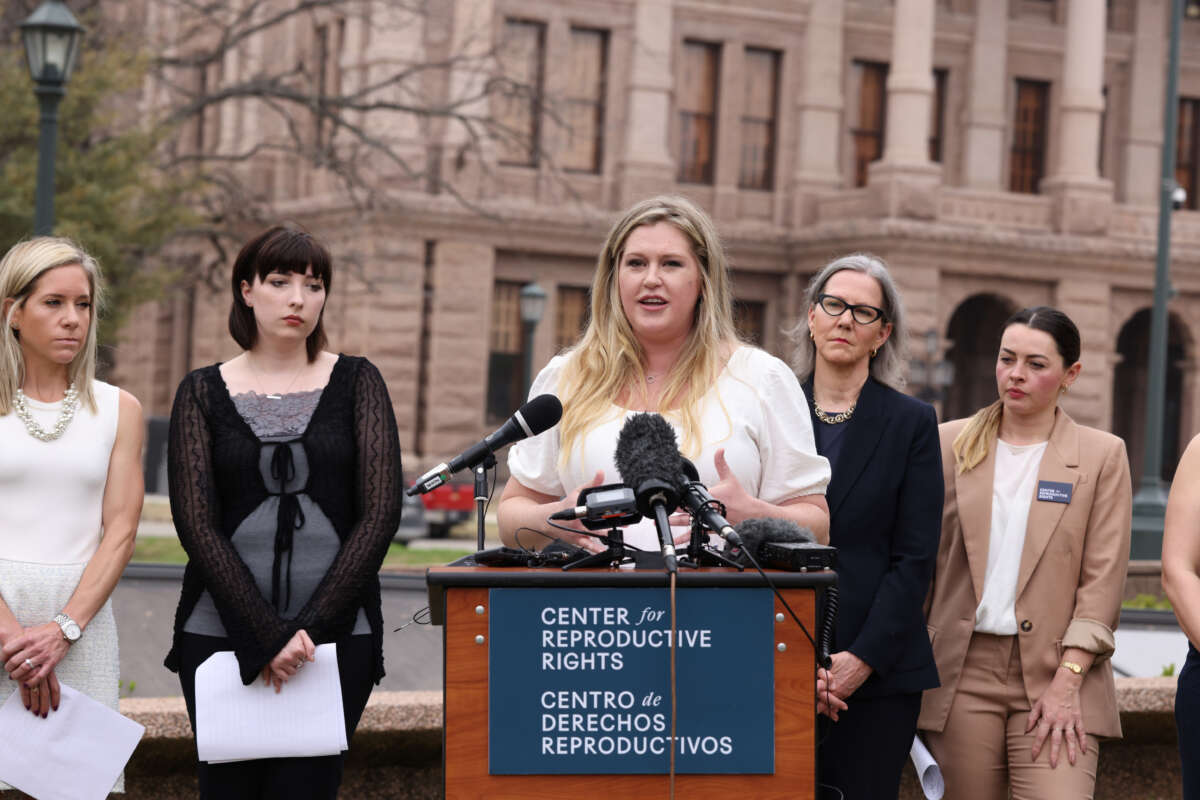Did you know that Truthout is a nonprofit and independently funded by readers like you? If you value what we do, please support our work with a donation.
Texas will continue enforcing bans on performing abortions even when pregnancies develop serious complications, following a decision issued Friday by the state Supreme Court.
The ruling means physicians must wait until patients are dangerously ill before terminating their pregnancies — in some cases resulting in otherwise preventable health complications. Under the law, learning that a fetus is unlikely to survive does not allow doctors to perform an abortion.
Under this case, known as Zurawski v. Texas, 20 women and two doctors sued the state of Texas, with many arguing that the state’s abortion laws endangered their lives. Some left the state for care. Others, including lead plaintiff Amanda Zurawski, had to wait until they contracted sepsis, a life-threatening infection, before they could receive an abortion. Some have been told they may struggle to become pregnant again as a result of medical complications they developed while waiting for an abortion.
The lawsuit, filed by the Center for Reproductive Rights, did not seek to overturn Texas’ abortion bans; instead, plaintiffs wanted clarity from the state about when people facing dangerous pregnancy complications could receive abortions. Texas is the largest state in the country to have banned abortions. The Texas lawsuit also inspired comparable litigation in Tennessee and Idaho; both cases, also filed by the Center for Reproductive Rights, are still ongoing.
The Texas court had previously ruled against Texas woman Kate Cox in a separate but similar case; by the time the court ruled in Cox’ case, she had already left the state to receive an abortion.
The Texas court’s decision means that the state’s heavily restrictive bans — which prohibit the procedure in almost all situations, without exceptions for rape or incest — will remain in effect, even in medically complex scenarios.
Doctors in Texas and across the country have said that even when states’ abortion bans offer exceptions to save the pregnant person’s life, the language on what qualifies is ambiguous at best. Without clear guidance, medical providers aren’t always able to provide abortions when they would normally be deemed medically appropriate — when, for instance, a pregnant patient has cancer and needs an abortion before commencing chemotherapy.
In Texas, violating the state ban is a felony and can be punished by life in prison and at least $100,000 in fines. Abortion providers can also be sued by private citizens for at least $10,000 under the state’s six-week abortion ban, which went into place before Roe v. Wade was overturned.
A state judge in Austin ruled last summer that while this case proceeded, the state could not deny patients access to abortions when their doctors deemed care appropriate to save their life or to prevent irreversible damage to their health. The judge also ruled that physicians could provide patients with abortions if they discovered fatal fetal anomalies.
But that ruling, issued as a temporary injunction, had little impact. Almost immediately, the state attorney general appealed the decision, using a procedural mechanism that blocked the injunction from taking effect. The state’s Supreme Court then blocked the lower court ruling.
The state has argued that the fault is not with Texas’ abortion laws. Rather, they argued, doctors have been given all the guidance they need under the state’s narrow exception language, and said that if patients feel they are not getting needed treatment, the fault is with physicians for being unwilling to make decisions about their health.
A terrifying moment. We appeal for your support.
In the last weeks, we have witnessed an authoritarian assault on communities in Minnesota and across the nation.
The need for truthful, grassroots reporting is urgent at this cataclysmic historical moment. Yet, Trump-aligned billionaires and other allies have taken over many legacy media outlets — the culmination of a decades-long campaign to place control of the narrative into the hands of the political right.
We refuse to let Trump’s blatant propaganda machine go unchecked. Untethered to corporate ownership or advertisers, Truthout remains fearless in our reporting and our determination to use journalism as a tool for justice.
But we need your help just to fund our basic expenses. Over 80 percent of Truthout’s funding comes from small individual donations from our community of readers, and over a third of our total budget is supported by recurring monthly donors.
Truthout has launched a fundraiser, and we have a goal to add 273 new monthly donors in the next 72 hours. Whether you can make a small monthly donation or a larger one-time gift, Truthout only works with your support.
